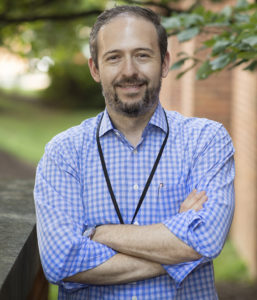Immune system – the seventh sense
Jonathan Kipnis
November 5, 2019 at 2:00 P.M. in the Pearl Young Theater
(video within Langley firewall only.)
Abstract
Immune cells and their derived molecules have major impact on brain function, but immune cells are not found within the brain’s functional tissue, adding mystery to the enigmatic interactions between immunity and the brain. We have recently discovered a presence of meningeal lymphatic vessels that drain brain molecules and immune cells to the lymph nodes, therefore physically connecting the brain and the immune system. This previously undiscovered communication between the central nervous and immune systems suggests new approaches for developing treatments for several neurological and psychiatric disorders. Examples are shown from multiple sclerosis and Alzheimer’s disease models.
Speaker
 Dr. Jonathan (Jony) Kipnis’s research group focuses on the complex interactions between the immune system and the central nervous system (CNS). The goal is to elucidate the cellular and molecular mechanisms underlying these interactions in neurodegenerative, neurodevelopmental, and mental disorders as well as in physiology (including healthy aging).
Dr. Jonathan (Jony) Kipnis’s research group focuses on the complex interactions between the immune system and the central nervous system (CNS). The goal is to elucidate the cellular and molecular mechanisms underlying these interactions in neurodegenerative, neurodevelopmental, and mental disorders as well as in physiology (including healthy aging).
Kipnis’s research team showed that the brain function is dependent, in part, on the function and integrity of the immune system and that immune molecules (cytokines) can play neuromodulatory roles. The fascination with immunity and its role in neurophysiology is what brought the team to a breakthrough discovery of meningeal lymphatic vessels that drain the CNS into the peripheral lymph nodes and thus serve as a physical connection between the brain and the immune system. This finding challenged the prevailing dogma of CNS being an “immune privileged organ” and opened new avenues to mechanistically study the nature of neuroimmune interactions under physiological and pathological conditions. The implications of this work are broad and range from Autism to Alzheimer’s disease through neuroinflammatory conditions, such as Multiple Sclerosis.
Dr. Kipnis graduated from the Weizmann Institute of Science in Israel, where he was a Sir Charles Clore scholar and a recipient of distinguished prize for scientific achievements awarded by the Israeli Parliament, The Knesset.
Dr. Kipnis joined UVA faculty in 2007. He is now a Harrison Distinguished Professor and Chair of the Neuroscience Department. Since 2015 he is also a Gutenberg Research College Fellow at the Johannes Gutenberg University Mainz Medical Center, Germany. In 2018 he received a prestigious NIH Director’s Pioneer award to explore in more depth neuro-immune interactions in healthy and diseased brain.